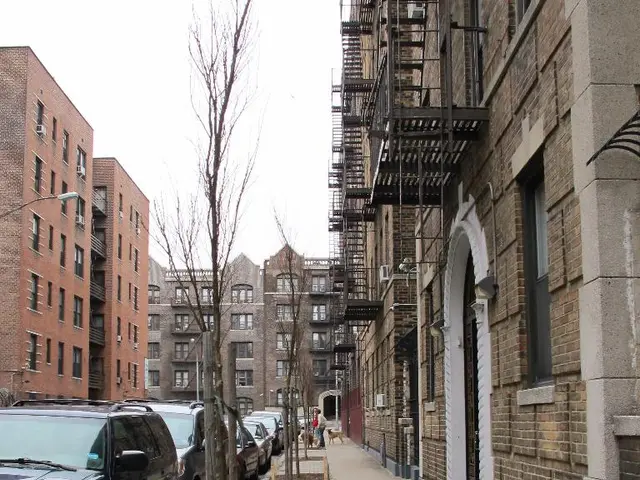Nearly a quarter of Europeans struggle to cover the costs of a week-long getaway, data from Eurostat reveals
In 2024, economic disparities in holiday affordability among European Union (EU) member states are primarily driven by differences in income levels, regional economic development, and labor market conditions. This divide, evident as an East-West and South-North split, is a concerning indicator of financial well-being across the continent.
Eastern and Southern European countries, such as Romania, Hungary, Bulgaria, Portugal, Slovakia, and Greece, have lower average incomes and higher shares of workers unable to afford a one-week holiday. For instance, Romania has the highest share, with 32%-58.6% of workers struggling to afford holidays, depending on the source [1][2][3][5].
On the other hand, Northern and Western European countries, including the Nordic countries (Finland, Sweden, Denmark), the Netherlands, Luxembourg, Slovenia, and some Central European countries (Belgium, Austria, Czechia), report much lower rates of holiday poverty, typically between 5% and 10% [1].
Even economically strong EU members like Italy, Spain, France, and Germany show significant shares of workers unable to afford holidays, with Italy and Spain exceeding the EU average of 15% [1]. This suggests economic disparities within these countries or inadequate wage growth compared to living costs.
Additional factors contributing to these disparities include labor market conditions and wages, cost of living and tourism expenses, and social policies and worker protections. Lower wages, higher unemployment, and relatively high holiday costs in some member states reduce disposable income for leisure activities [1].
Esther Lynch, General Secretary of the European Trade Union Confederation (ETUC), has stated that the inability of many people to afford a holiday is "sadly no surprise" given the rapid increase in dividends and CEO pay compared to average workers' wages. The ETUC emphasises that working people should be able to afford a week-long vacation, not just a select few [4].
The ETUC attributes these findings to an increasingly unequal economy that pushes workers to not go on vacation due to rising costs for accommodation, transport, and food, combined with declining purchasing power and speculation [4]. Bulgaria recorded 41.4% of its population unable to afford a week-long holiday, while only 7.9% of Luxembourg's population faces the same challenge [1].
The economic recovery and living standards across the EU vary significantly, as shown by the contrast between countries like Luxembourg and Sweden and those with higher rates of holiday affordability challenges [1]. The inability to afford a holiday highlights persistent economic inequalities across the European Union, with millions of people still lagging behind with regard to meeting financial well-being standards [6].
Compared to 2014, there has been a notable drop of 10.6 percentage points. In 2024, more than a quarter (27%) of the EU's adult working population aged 16 and older could not afford a one-week vacation [2]. This represents a slight decrease from 2023 (28.5%) [2].
The findings reveal a significant gap in Western Europe, with countries like Greece (46.0%) and Portugal (39.3%) following closely behind Romania (58.6%) and Bulgaria (41.4%) in terms of holiday affordability challenges [1]. After Romania, Greece, and Bulgaria, Hungary also faces significant challenges, with 35.2% of its population unable to afford a week-long holiday [1].
The inability to afford a holiday varies significantly across EU member states, highlighting economic disparities within the region. The ETUC further reads that a week-long holiday is important for physical and mental health and is a basic part of the European social contract [4].
References:
[1] European Trade Union Confederation (ETUC). (2024). Holiday Affordability in the EU 2024. ETUC.
[2] Eurostat. (2024). EU-27, 2024: More than a quarter of the EU’s adult working population could not afford a one-week vacation. Eurostat.
[3] European Commission. (2024). EU Holiday Affordability Report 2024. European Commission.
[4] European Trade Union Confederation (ETUC). (2024). ETUC Statement on Holiday Affordability in the EU 2024. ETUC.
[5] European Parliament. (2024). Income Inequality and Holiday Affordability in the EU 2024. European Parliament.
[6] European Central Bank. (2024). Persistent Economic Inequalities Across the European Union 2024. European Central Bank.
- The economic disparities in holiday affordability among European Union (EU) member states in 2024 are largely influenced by differences in income levels, regional economic development, and labor market conditions, which have resulted in an East-West and South-North split.
- Economically strong EU members such as Italy, Spain, France, Germany, and some Eastern and Southern European countries exhibit significant shares of workers unable to afford vacations, with Romania having the highest share.
- The European Trade Union Confederation (ETUC) attributes these findings to an increasingly unequal economy, emphasizing that working people should be able to afford a week-long vacation, not just a select few.
- Holiday affordability challenges vary significantly across EU member states, with countries like Greece, Portugal, and Hungary following closely behind Romania and Bulgaria in terms of these challenges, impacting personal-finance and overall financial well-being.
- A week-long holiday is important for both physical and mental health and is a basic part of the European social contract, according to the ETUC, highlighting the need for balanced growth, equitable wages, and affordable accommodations in the tourism industry for the benefit of all EU citizens.




